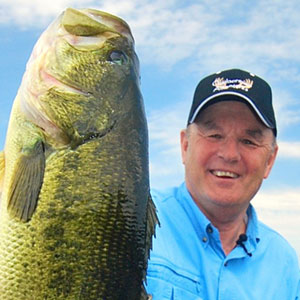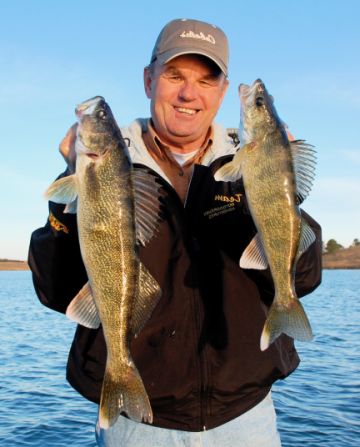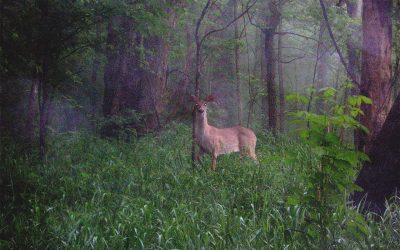When fishing conditions are really tough in early spring, it may be time to tie on the simple split shot rig. It seems many anglers are overlooking this basic presentation method, but when working cold waters or cold front conditions, it can put fish in the boat like no other method.
Early spring fishing can be tough. With the cool weather we have been facing this year and heavy winds pounding the water, it seems to just guarantee a lack of success.
But it doesn’t have to be that way. The fish are there, and they will bite if your presentation will tempt them.
In a normal spring, we usually look for warming water brought about by a warming sun and temperatures to boot. Find the warmest water in the lake and you will find walleyes, largemouth or smallmouth bass and panfish willing to bite. Now, however, water temperatures are in the low 50s. If we can just get a week of normal, warming temperatures fish activity will heat up.
In the meantime, what should you do?
Well, I have a suggestion that has worked well for me over the years under the toughest of conditions. Of course it only works when fish are in shallow water, say 10 feet or less. It is the simplest of presentations. It’s been my go-to set up since the 1970s. So, it is nothing new but I am afraid most angler have simply forgotten about it.
It’s called the split shot rig. That’s right, a simple hook on the end of your line. About 15 inches above the hook is a split shot about the size of a pea.
For walleyes, attach a medium sized minnow to the hook. For bass, either largemouth or smallmouth, use a small worm hook and rig a 4-inch worm (I prefer Berkeley Power Worms) rigged Texas style.
Pretty standard fare, but let’s take a look at the rig itself.
Years ago we simply used an Aberdeen style gold hook, either a Mustad or Eagle Claw, in size four. That will still work just fine, but another hook option is the short-shanked, up-eye hook used most often for walleyes. I like a size 4 for smaller minnows.
There are a couple different kinds of split shots. Some come with short “ears” which can open the split shot after it is attached to the line. These are really handy, but those little ears tend to hang up when used on rock-rubble areas and while they do not snag up very often, the little pulses they send up the line as they tap the rocks is irritating. I much prefer to use the simple, round split shots. They tend to move across the bottom much better and will not pick up any weeds or other debris.
I think line is very important in the split shot presentation. Certainly don’t use anything above six pound test and four is even better. There’s not much weight to get you down on the bottom so smaller diameter line is best. While it may be splitting hairs, I much prefer fluorocarbon line, not only because it is nearly invisible to the fish, but because it sinks. Monofilament floats. As I said, a really little detail, but successful fishing is often brought about by little details.
Another line which works well with this method is Fireline. I like Crystal in six pound test which in diameter is equivalent to two-pound-test monofilament. I don’t tend to use a fluorocarbon leader with this line, but if you prefer a 30-inch piece of six-pound-test fluorocarbon line attached with a pair of uni-knots will work well.
By the time you read this, most walleyes will have already spawned. But, you should still seek out spawning areas because not all walleyes spawn at the same time, and the smaller males will stay on the spawning grounds for at least a couple of weeks.
So in natural lakes look for rock, rubble areas associated with the shoreline. Fish water from about four feet to 10 feet. Slow is important this time of year and one advantage of the split shot rig is it will force you to fish slowly. You want to be on the bottom so stop and go trolling techniques are the best. Don’t work in a straight line. Walleye waters this time of year are very clear and even if they are not, walleyes will spook out from under a boat in shallow water. If you troll in a zig-zag fashion you will be pulling your rig over water you haven’t covered with your boat.
When using the 4-inch worm for bass, I prefer to cast. For smallmouth, find a rock reef or rocky shoreline and cast the rig and let it settle to the bottom. Then slowly lift and drop all the way back to the boat. If you feel a fish, drop the rod tip, reel in the slack and then set the hook. Largemouth this time of year will be on flats with newly emerging weeds or clumps of still-green weeds from last year. Also look for them in shallow canals or shallow bays.
I prefer rather long, light rods for split shot rig fishing. A six-and-a-half-foot or seven-foot, medium light action spinning rod is perfect. The longer rod will allow you to hook fish better because a lot of slack can develop in this rig so the extra length can mean the difference between hooking up to a light biting walleye or missing the fish.
The drop shot rig is probably the beginning of “finesse” fishing applications, even though it was being used far earlier than when the word “finesse” was applied to fishing techniques. And this one is unique to upper Mid West waters.
Gary Howey is an award-winning writer, producer, broadcaster, former tournament angler, fishing and hunting guide and in 2017 inducted into the “National Freshwater Fishing Hall of Fame”.
He developed and was the Producer-Host for 23 years of his award winning gary Howey’s Outdoorsmen Adventures television series. He’s the Host of the award-winning Outdoor Adventures radio program carried on Classic Hits 106.3, ESPN Sports Radio 1570 in Southeastern South Dakota, KWYR Country 93 AM and Magic 93 FM in Central South Dakota, As well as on KCHE 92.1 FM in Northwest Iowa. If you’re looking for more outdoor information, check out www.GaryHowey’soutdoors.com , and www.outdoorsmenadventures.com, with more information on these Facebook pages, Gary Howey, Gary E Howey, Outdoor Adventure Radio, Outdoorsmen Productions and Team Outdoorsmen Productions. The Outdoor Adventures television show is available on numerous Independent markets, and the MIDCO Sports Network.
-30-






0 Comments